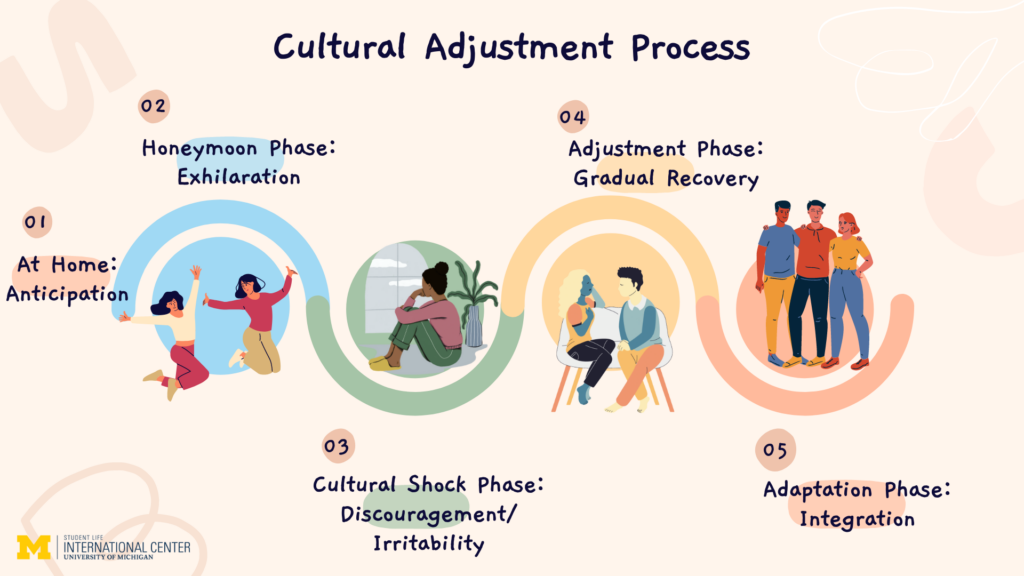Moving to a new country for education is an exciting adventure, but it also comes with unique challenges. As an international student, adjusting to a new culture can be both rewarding and daunting. This guide provides actionable cultural adjustment tips to help you navigate your new environment with confidence and ease.
Understanding Culture Shock
What is Culture Shock?
Culture shock refers to the feelings of confusion, discomfort, and uncertainty experienced when adjusting to a new culture. It’s a common experience for international students as they encounter unfamiliar customs, languages, and social norms.
The Four Stages of Culture Shock

- Honeymoon Stage – Excitement and fascination with the new culture. Everything feels novel and thrilling.
- Frustration Stage – Challenges with language barriers, social cues, and homesickness can cause frustration and anxiety.
- Adjustment Stage – Gradual adaptation to the new environment, where routines are established, and the culture feels less intimidating.
- Acceptance Stage – A sense of belonging and comfort develops, making the new culture feel like a second home.
Essential Cultural Adjustment Tips

1. Research Before You Arrive
Preparation is key to easing your transition. Before you leave for your host country, take time to:
- Learn about the country’s history, traditions, and values.
- Research the climate and pack appropriate clothing.
- Familiarize yourself with the education system and academic expectations.
- Read about cultural norms and social etiquette to avoid unintentional faux pas.
Useful resources include:
- Official tourism websites
- Travel guides and blogs
- Online forums like Reddit or Quora for firsthand experiences
2. Embrace Open-Mindedness
A positive mindset makes cultural adjustment smoother. To broaden your horizons:
- Be curious about new experiences and perspectives.
- Avoid making quick judgments about unfamiliar customs.
- Treat every interaction as a learning opportunity.
For instance, trying local foods, attending traditional festivals, or learning about the region’s history can deepen your understanding and appreciation of the culture.
3. Build a Support Network
Building connections in your new environment can provide emotional support and a sense of belonging. Here’s how:
- Join Student Organizations: Universities often have clubs for international students, cultural groups, and recreational activities.
- Attend Orientation Events: These are great opportunities to meet peers and learn about campus resources.
- Engage with Locals: Participate in community events or volunteer activities to interact with local residents and immerse yourself in the culture.
Explore a student community or cultural club website.
4. Manage Homesickness
Homesickness is a natural part of living away from home. To mitigate it:
- Stay Connected: Schedule regular video calls with loved ones to maintain strong ties.
- Create a Familiar Environment: Decorate your living space with items that remind you of home, such as photos, souvenirs, or favorite snacks.
- Keep Busy: Engage in academic, social, or recreational activities to distract yourself from feelings of loneliness.
5. Learn and Respect Local Customs
Understanding and respecting local customs fosters mutual respect and smoother interactions. Key areas to observe include:
- Greetings: Learn how people greet each other, whether it’s a handshake, bow, or verbal greeting.
- Dining Etiquette: Familiarize yourself with table manners and tipping practices.
- Public Behavior: Pay attention to norms around noise levels, personal space, and queuing.
6. Take Care of Your Mental Health
Adjusting to a new culture can be mentally taxing. To prioritize your well-being:
- Utilize University Resources: Many universities offer free or low-cost counseling services for students.
- Practice Self-Care: Engage in activities that relax and rejuvenate you, such as exercise, hobbies, or meditation.
- Seek Support: Don’t hesitate to reach out to friends, family, or professionals if you’re struggling.
7. Stay Active and Explore
Exploring your surroundings not only helps you adjust but also makes the experience more enjoyable. Here are some ideas:
- Discover Local Attractions: Visit museums, parks, or historical sites.
- Join Recreational Activities: Participate in sports, fitness classes, or hiking groups.
- Try Local Transportation: Using public transport can help you navigate the city and interact with locals.
Overcoming Language Barriers
Practice Daily
Practice is the most effective way to overcome language barriers. Here’s how:
- Converse with locals regularly, even if you’re not fluent.
- Practice speaking, reading, writing, and listening skills daily.
- Watch local TV shows, movies, or YouTube videos to enhance your understanding.
Use Technology
Leverage technology to bridge communication gaps:
- Language Apps: Use apps like Duolingo, Babbel, or Rosetta Stone to build vocabulary and grammar skills.
- Translation Tools: Google Translate can assist with quick translations during conversations or while navigating signs and menus.
Take a Class
Formal language classes can provide structured learning and opportunities to practice with peers. Check if your university or local community offers:
- Beginner to advanced language courses.
- Language exchange programs where you can teach your native language while learning the local one.
Explore Language learning resources or local classes
Conclusion
Adjusting to a new culture as an international student takes time, patience, and effort. Embrace the journey with an open mind and a proactive approach. By following these detailed cultural adjustment tips, you can transform challenges into growth opportunities and make the most of your experience abroad.



